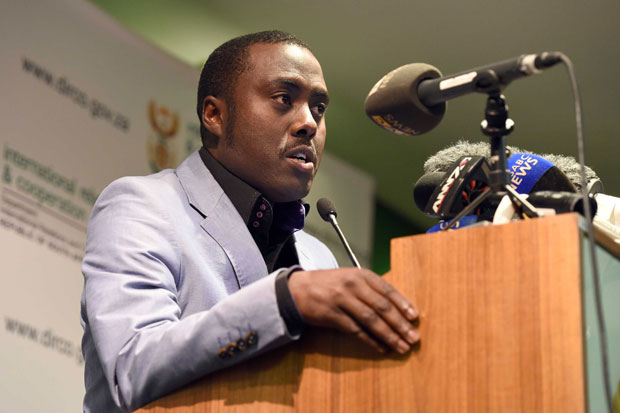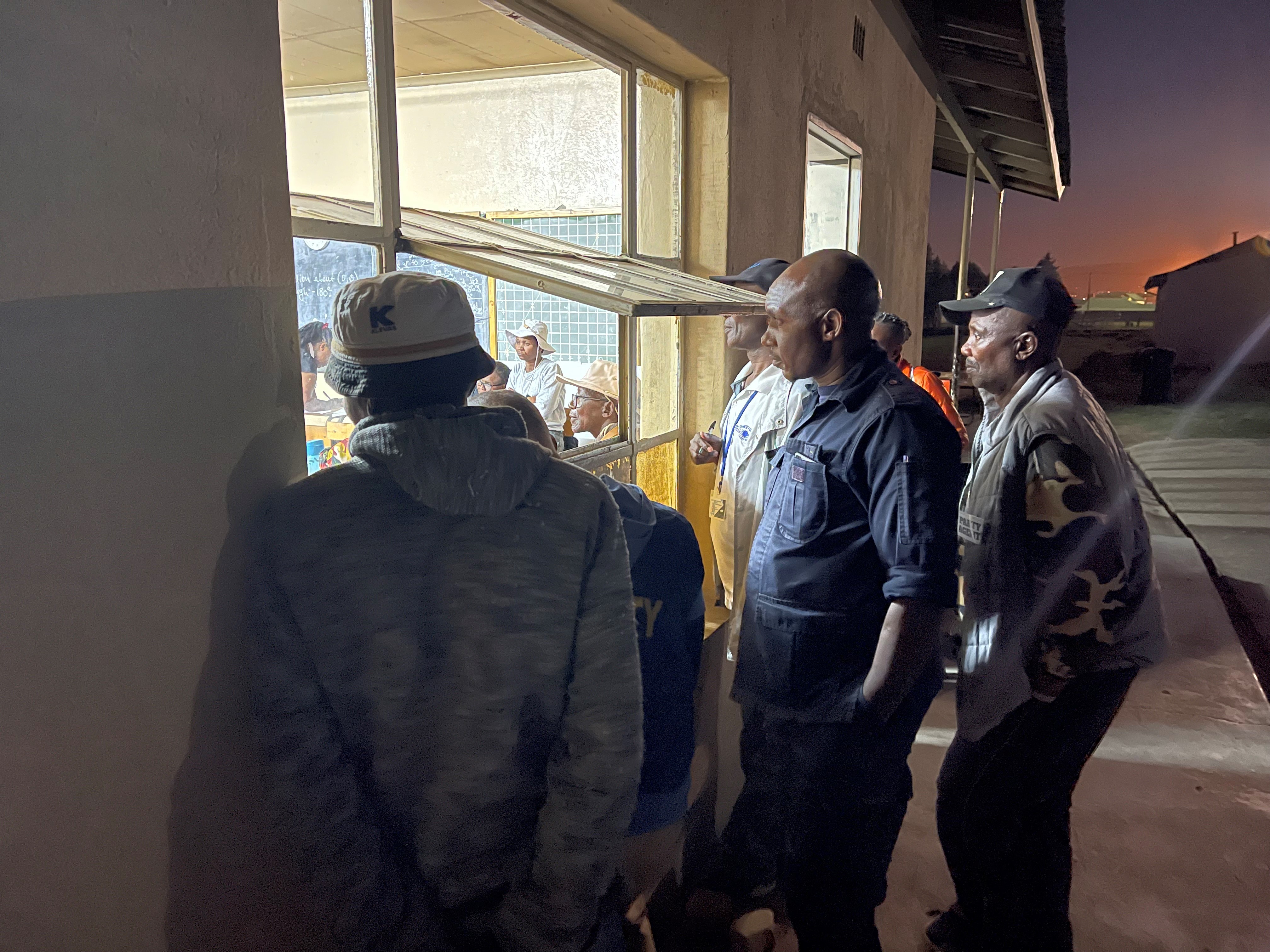News
Dirco and the Ukraine War — The Department of Whataboutism
Using 'whataboutism' is a sloppy way to argue. It would be more useful if the department's Clayson Monyela addressed the substance of the argument.

Director, The Brenthurst Foundation

Research Director, The Brenthurst Foundation

Department of international relations spokesperson Clayson Monyela's rebuttal “Why is the Brenthurst Foundation obsessed with Ukraine — what about Palestine, Yemen, Libya, Western Sahara?” of our article last week — “Naledi Pandor: The Minister of Utter Incomprehensibility and Obstruction” — is a sad attempt to defend the indefensible.
One might equally ask: “Why is Clayson Monyela obsessed with the Brenthurst Foundation — what about the ANC Youth League's partisan support for Russia's illegitimate referendums in occupied parts of Ukraine?”
The images of these ANC stalwarts waving Russian flags and grinning gormlessly in the violently occupied territories are surely the greatest diplomatic embarrassment South Africa has suffered in recent times, but Monyela and his boss, Naledi Pandor, have nothing to say about it.
Two can play whataboutism. Why is Ethiopia — a country where the Brenthurst Foundation has worked and where our chairman, President Olusegun Obasanjo, is the AU's Special Envoy — not on Monyela's laundry list of important causes?
A visit to our website would reveal that the Brenthurst Foundation has been “obsessed” with Ethiopia — visiting the frontlines in Tigray and assisting with efforts at mediation.
What about Somaliland? It's one of Africa's foremost democracies with five successive democratic elections and changes of government not recognised by South Africa, which appears “obsessed” with recognising Western Sahara. A solution to that dispute is being managed by multilateral organisations such as the UN, and Monyela and the minister always defer to multilateralism. Except they don't in this case, choosing instead to shout from the sidelines.
We have worked in Ethiopia, Somaliland, Zanzibar, Zambia and Lesotho, among other places, over the past year, but this work is not interesting to Monyela because it doesn't chime nicely with his tired old “Western imperialism” narrative.
We have also written a book on policy in South Africa, “Better Choices”, and one on the spectacular failure of Western aid to move the dial, “Expensive Poverty”, while being “obsessed” with Ukraine.
Using whataboutism is a sloppy way to argue. Much more useful is to address the substance of the argument. Monyela's argument is weak in three respects:
First, while he is correct in deducing that the minister's statement to the 77th UN General Assembly sparked our article, it was not the bit he assumed: that the world should “treat all conflicts across the globe with equal indignation, no matter what the colour or creed of the people affected”. We have no beef with that: if only the South African government actually matched such rhetoric with actions.
Rather, it was this special phrase uttered by Minister Pandor that got our attention: Having listened to leader after leader speak on Ukraine, Pandor's suggestion that the biggest global challenges were not the rule of international law or the risk of nuclear war caused by the Russian invasion on 24 February, but rather “poverty, inequality, joblessness and…” take a deep breath, “… a feeling of being entirely ignored and excluded”.
It's the last bit that sticks. It's the tone of a whiny, ignored teenager and its effect is to dilute South Africa's influence by underscoring that it — and Dirco for that matter — is not being heard. Why is this? The reason no one listens to Dirco, Clayson, is that it is the absent father of southern Africa.
When elections are rigged and stolen, when economies collapse under the weight of looting, when governments become narco-states, they remain schtum and with their hands in their pockets (and hopefully not, like much of the rest of government, in someone else's pockets).
Coupled with South Africa's recently quite hopeless economic performance — the lights are again out as we pen this reply — the consequence is that South Africa's international voice is diminished.
People have tuned out and are turned off.
Perhaps there is one hand clapping in Russia and another in North Korea. But for the democratic world which values sovereignty, raging on about inequality and Cuba's role in the liberation struggle is not a convincing argument that we are in the trenches fighting for accountable democracy.
Second, Monyela then makes the leap in writing that, “Like some in the Western world [presumably with a childish conspiratorial nudge and wink], Mills and Hartley have prioritised the conflict in Ukraine above every other conflict and gross violation of human rights occurring elsewhere on the globe. One wonders whether the lives that are being lost in conflicts such as in Palestine or Yemen don't matter.”
Again, that is not what we said at all. The reason we have recently prioritised the conflict in Ukraine in our research is because that conflict threatens world peace and food security in Africa, and reflects back on us in terms of our support (or not, in the SA government's case) on critical issues of international law, democracy, human rights and territorial sovereignty.
As for the “Western World” slur, why does Monyela ignore the fact that 27 African countries voted to condemn the invasion of Ukraine at the UN, while 17 abstained and one voted with Russia? What about Nigeria, Egypt and Kenya, the other three points of Africa's economic diamond? They have condemned the invasion.
Are we to believe they are all vassals of the West?
On the subject of malign foreign powers, why does Monyela have nothing to say about the presence of the Wagner mercenary group in the Sahel and elsewhere, supporting coups and executing Africans who get in the way?
Of course the lives lost in other conflicts in the Middle East matter. So do those lost in Zimbabwe, Eastern DRC, CAR, Mozambique, Ethiopia, Eritrea and Sudan. None of these, which share the absence of social peace and security, made Monyela's laundry list. This points to a constant failure by the ANC. Its default is to externalise conflict. Yet when its friends violate human rights or rig elections, it is silent and even argues that they should not be sanctioned.
In the land of Dirco, it seems the one-eyed writer is king.
And third, in playing the man and not the ball, Monyela again forgets to do his homework. He accuses one of us (Mills) of having served as an adviser to the ISAF commander in Afghanistan in 2006 — this is apparently proof that we were now furthering another global agenda in criticising the foreign policy of the country in which we were born and to which we pay our taxes (and his salary).
It was not one tour, but four, Clayson, as a trip to our website (www.thebrenthurstfoundation.org) might have informed you, excluding the time spent in assisting President Ashraf Ghani in the palace in 2021 shortly before Kabul fell.
Monyela should read “The Ledger” (authored by Mills), which is globally recognised as the most complete, scouring critique of the failings of the Western intervention in Afghanistan.
Of course, to make such criticisms with credibility, you had to be there to observe and learn about the limits of external powers, no matter how powerful they are. It also offered the opportunity to roll up one's sleeves and assist those less fortunate; something that probably comes as a shock to some South African bureaucrats, who don't like the feel of the streets.

It also afforded the occasion to assist refugees from Afghanistan when Kabul fell, and it is with some pride we can report that, together with an Australian-American colleague, we managed to extract nearly 1,700 people in the two weeks between Ghani fleeing and Kabul falling to the Taliban.
He also writes that taking John Steenhuisen to Ukraine was a demonstration of bias. The leader of the opposition asked, and we agreed. So, too, did Bobi Wine and Zitto Kabwe, two prominent opposition leaders from Uganda and Tanzania. It was a trip that had political and practical outcomes. In Ukraine, Bobi recorded two solidarity songs with local artists. It showed that Africa was a participant in international affairs and had a voice, and was not always just a spectator yelling at the referee about the unfairness of the rules.
Human rights — humanity itself — is indivisible, a quality which all three visitors have shown in going the extra mile to find out for themselves what is going on in Ukraine.
The point here is that we are free to take whomever we wish to Ukraine or anywhere else we are free to travel to. The difference with government, is that we actually go, and don't do it by remote control and through exhibiting our own prejudice.
We argued that at the core of South Africa's Constitution is the directive to build an inclusive, socially just society. The Constitution makes it clear that these noble objectives will not be achieved unless we have an open, accountable and transparent democracy.
Democracy is our core value, the fulcrum around which all others orbit. It should be defended and promoted at home and abroad.
While Monyela fixates on Dirco's bread-and-butter serving of Cuba, Palestine, Western Sahara, Libya (the invasion of which was incidentally supported by the South African government) and Yemen, we believe that Ukraine must be top of mind.
Monyela's Russian friends are threatening nuclear war, Africa's food supplies are at risk, a global recession driven by an energy disaster looms.
Ukraine, a sovereign democracy subjected to colonial invasion by a dangerous autocracy, says a lot about international law and human rights — and especially of the direction in which those countries which have not defended these attributes are heading. South Africa's fiddly fiddlestix approach to this epochal conflict is frankly embarrassing.
We should be talking about Cuba. Why are we funding this undemocratic autocracy? Because it once supported the Struggle? The critical faculties of the ANC, which Monyela defends, are warped beyond salvage.
Similarly, there is another error routinely committed by Monyela and his colleagues — defending the invasion of Ukraine on the grounds that the West defended the invasion of Iraq. To remind you, Clayson, of the kindergarten rule of diplomacy: two wrongs don't make a right. If you really believe the invasion of Iraq was wrong out of principle, you ought to be equally indignant at the invasion of Ukraine.
A final word of advice: Do your homework, visit Ukraine, walk in the shoes of the people whose rights you blithely dismiss. And listen to the voices of your seniors in Africa who don't share your biases.
This article originally appeared on the Daily Maverick
Photo: GovernmentZA Flickr

